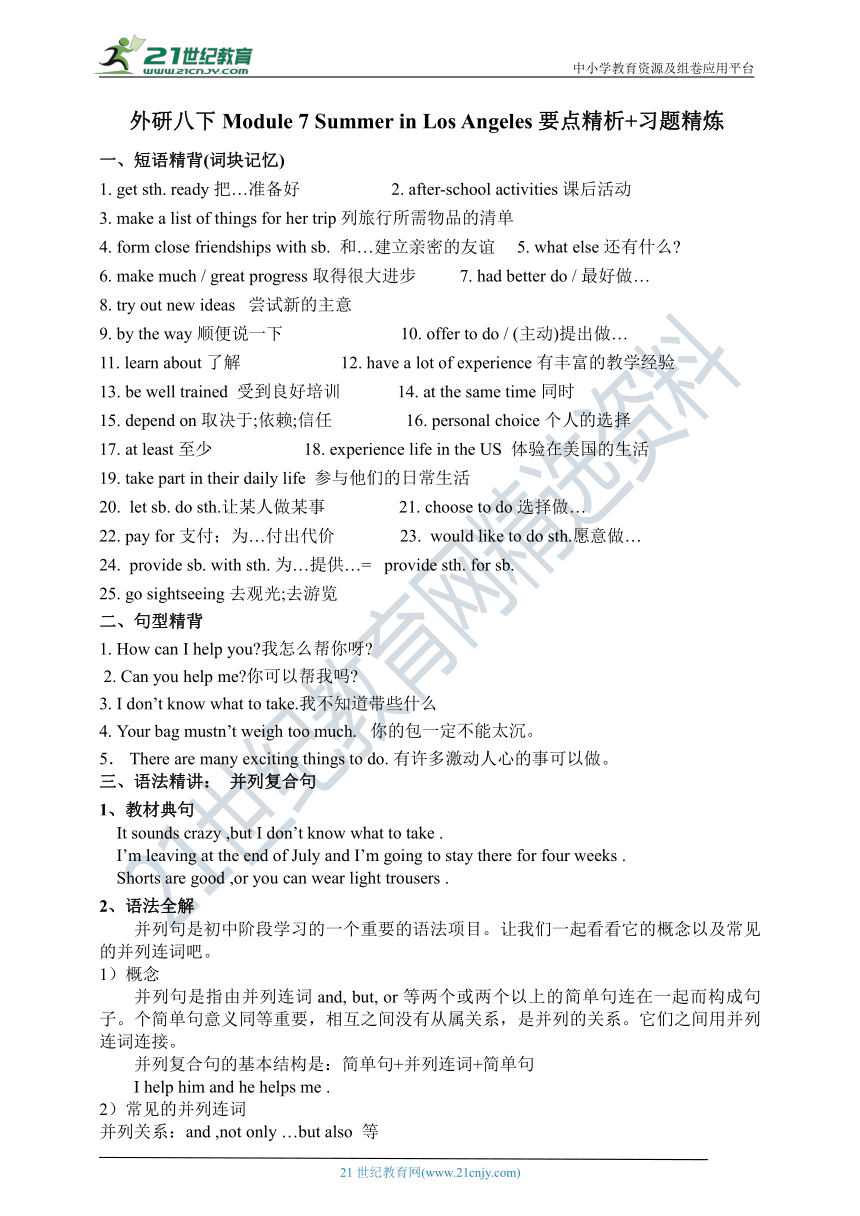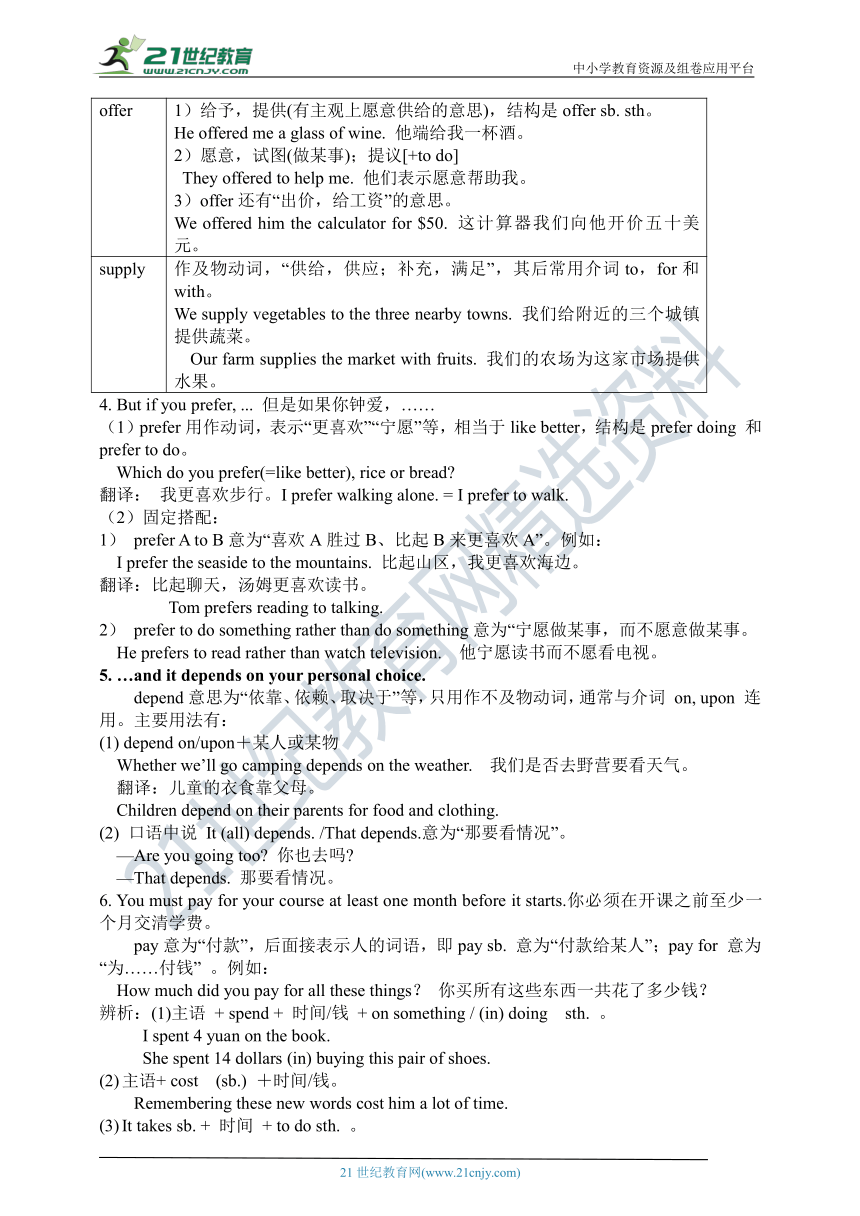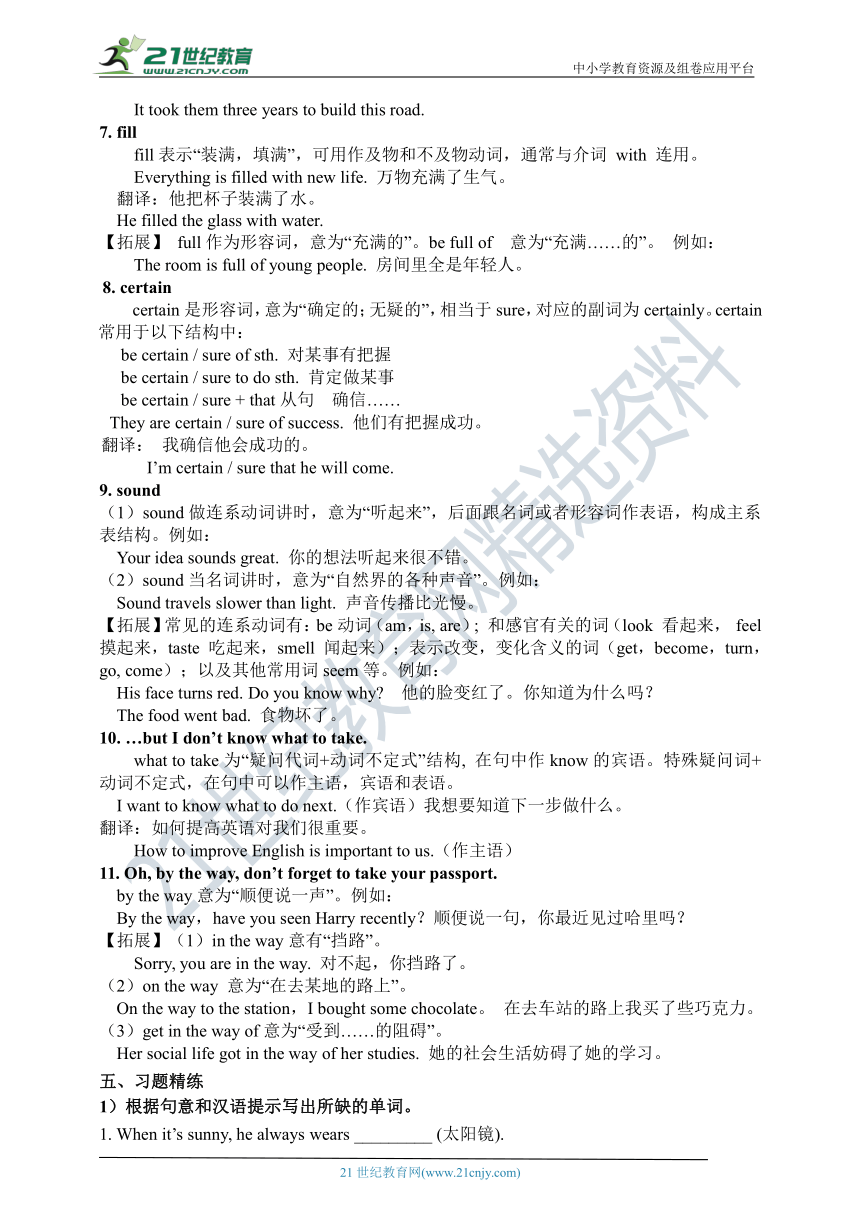Module 7 Summer in Los Angeles 模块同步学案(要点精析+习题精炼)
文档属性
| 名称 | Module 7 Summer in Los Angeles 模块同步学案(要点精析+习题精炼) |

|
|
| 格式 | zip | ||
| 文件大小 | 1.2MB | ||
| 资源类型 | 试卷 | ||
| 版本资源 | 外研版 | ||
| 科目 | 英语 | ||
| 更新时间 | 2020-03-29 00:00:00 | ||
图片预览




文档简介
中小学教育资源及组卷应用平台
外研八下Module 7 Summer in Los Angeles要点精析+习题精炼
一、短语精背(词块记忆)
1.?get?sth.?ready把…准备好??????????? 2.?after-school?activities课后活动?
3.?make?a?list?of?things?for?her?trip?列旅行所需物品的清单??
4.?form?close?friendships?with?sb. 和…建立亲密的友谊? 5.?what?else?还有什么??
6.?make?much?/?great?progress?取得很大进步 7.?had?better?do?/?最好做…
8.?try out new ideas ?尝试新的主意
9.?by?the?way顺便说一下? 10.?offer?to?do?/?(主动)提出做…?
11.?learn?about了解? 12.?have?a?lot?of?experience有丰富的教学经验
13.?be?well?trained 受到良好培训? 14.?at?the?same?time同时?
15.?depend?on?取决于;依赖;信任? 16.?personal?choice个人的选择?
17.?at?least?至少? 18.?experience?life?in?the?US 体验在美国的生活?
19.?take?part?in?their?daily?life 参与他们的日常生活?
20.??let?sb.?do?sth.让某人做某事? 21.?choose?to?do?选择做…?
22. pay?for?支付;为…付出代价? 23.??would?like?to?do?sth.愿意做…
24.??provide?sb.?with?sth.?为…提供…= ?provide?sth.?for?sb.?
25.?go?sightseeing去观光;去游览?
二、句型精背
1.?How?can?I?help?you?我怎么帮你呀?
?2.?Can?you?help?me?你可以帮我吗??
3.?I?don’t?know?what?to?take.我不知道带些什么?
4.?Your?bag?mustn’t?weigh?too?much.???你的包一定不能太沉。?
5.?There?are?many?exciting?things?to?do.?有许多激动人心的事可以做。??
三、语法精讲: 并列复合句
1、教材典句
It sounds crazy ,but I don’t know what to take .
I’m leaving at the end of July and I’m going to stay there for four weeks .
Shorts are good ,or you can wear light trousers .
语法全解
并列句是初中阶段学习的一个重要的语法项目。让我们一起看看它的概念以及常见的并列连词吧。
1)概念
并列句是指由并列连词and, but, or等两个或两个以上的简单句连在一起而构成句子。个简单句意义同等重要,相互之间没有从属关系,是并列的关系。它们之间用并列连词连接。
并列复合句的基本结构是:简单句+并列连词+简单句
I help him and he helps me .
2)常见的并列连词
并列关系:and ,not only …but also 等
He gave me a present and I liked it very much.
I used to live in Paris and London.
选择关系:or ,either ..or 等
You can dance in the park ,or you can run to exercise.
The children can go with us, or they can stay at home.
转折关系:but ,however ,yet ,while 等
I am a Chinese ,but my husband is from America.
I’m good at dancing ,while he is good at singing.
例子:I used to live in Paris and London. 我曾在巴黎和伦敦住过。
Tom went to the party, but his brother didn’t. 汤姆去参加聚会了,他的弟弟却没去。
The children can go with us, or they can stay at home.
孩子们可以跟我们走,也可以待在家里。
3、语法练习
1)It’s getting dark ,_____ they’re still working .
A. and B. but C. so D. or
2) We are going to the bookstore in Tony’ s car .You can come with us ______ you can meet us there later .
A. but B. and C. or D. then
3) Tom isn’t good at playing football ,______ he enjoys watching football matches .
A. but B. and C. or D. for
4) Study hard ,______ you are sure to have a good result in the exam .
A. or B. and C. for D. but
四、知识点精讲
1. be crazy about
be crazy about意为“对……而疯狂,热爱,痴迷于”,about为介词,后跟名词或动名词。
I used to be crazy about English. 过去,英语使我疯狂。
翻译:我热衷于篮球。
I am crazy about playing basketball.
【拓展】 表达“喜欢”的其他短语:be interested in ; be fond of等。例如:
He is interested in the French culture. 他对法国文化感兴趣。
2. You’d better ask the travel company about the total weight for all your bags.你最好问一下旅行公司关于你所有包的总重量问题。
had better意为“最好”,后面接动词原形,其否定形式是将not置于better之后。例如:
You had better not miss the last bus. 你最好不要错过末班公共汽车。
翻译:你最好立即去医院看病。
You’d better go to hospital at once.
3. We provide books. 我们提供书籍。
provide意为“提供;供应”,其常用搭配:provide sth. for sb. =provide sb. with sth.
The organization provides young people with work. 这个组织为年轻人提供工作。
翻译:太阳给我们提供光和热。
The Sun provides us with light and heat.
【拓展】 辨析:offer,provide与supply
offer 1)给予,提供(有主观上愿意供给的意思),结构是offer sb. sth。 He offered me a glass of wine. 他端给我一杯酒。 2)愿意,试图(做某事);提议[+to do] They offered to help me. 他们表示愿意帮助我。 3)offer还有“出价,给工资”的意思。 We offered him the calculator for $50. 这计算器我们向他开价五十美元。
supply 作及物动词,“供给,供应;补充,满足”,其后常用介词to,for和with。 We supply vegetables to the three nearby towns. 我们给附近的三个城镇提供蔬菜。 Our farm supplies the market with fruits. 我们的农场为这家市场提供水果。
4. But if you prefer, ... 但是如果你钟爱,……
(1)prefer用作动词,表示“更喜欢”“宁愿”等,相当于like better,结构是prefer doing 和prefer to do。
Which do you prefer(=like better), rice or bread?
翻译: 我更喜欢步行。I prefer walking alone. = I prefer to walk.
(2)固定搭配:
1) prefer A to B意为“喜欢A胜过B、比起B来更喜欢A”。例如:
I prefer the seaside to the mountains. 比起山区,我更喜欢海边。
翻译:比起聊天,汤姆更喜欢读书。
Tom prefers reading to talking.
2) prefer to do something rather than do something意为“宁愿做某事,而不愿意做某事。
He prefers to read rather than watch television. 他宁愿读书而不愿看电视。
5. …and it depends on your personal choice.
depend意思为“依靠、依赖、取决于”等,只用作不及物动词,通常与介词 on, upon 连用。主要用法有:
(1) depend on/upon+某人或某物
Whether we’ll go camping depends on the weather. 我们是否去野营要看天气。
翻译:儿童的衣食靠父母。
Children depend on their parents for food and clothing.
(2) 口语中说 It (all) depends. /That depends.意为“那要看情况”。
—Are you going too? 你也去吗?
—That depends. 那要看情况。
6. You must pay for your course at least one month before it starts.你必须在开课之前至少一个月交清学费。
pay意为“付款”,后面接表示人的词语,即pay sb. 意为“付款给某人”;pay for 意为“为……付钱” 。例如:
How much did you pay for all these things? 你买所有这些东西一共花了多少钱?
辨析:(1)主语 + spend + 时间/钱 + on something / (in) doing sth. 。
I spent 4 yuan on the book.
She spent 14 dollars (in) buying this pair of shoes.
主语+ cost (sb.) +时间/钱。
Remembering these new words cost him a lot of time.
It takes sb. + 时间 + to do sth. 。
It took them three years to build this road.
7. fill
fill表示“装满,填满”,可用作及物和不及物动词,通常与介词 with 连用。
Everything?is?filled?with?new?life.??万物充满了生气。
翻译:他把杯子装满了水。
He filled the glass with water.
【拓展】 full?作为形容词,意为“充满的”。be full of?? 意为“充满……的”。 例如:
The room is full of young people. 房间里全是年轻人。
8. certain
certain是形容词,意为“确定的;无疑的”,相当于sure,对应的副词为certainly。certain常用于以下结构中:
be certain / sure of sth. 对某事有把握
be certain / sure to do sth. 肯定做某事
be certain / sure + that从句 确信……
They are certain / sure of success. 他们有把握成功。
翻译: 我确信他会成功的。
I’m certain / sure that he will come.
9. sound
(1)sound做连系动词讲时,意为“听起来”,后面跟名词或者形容词作表语,构成主系表结构。例如:
Your idea sounds great. 你的想法听起来很不错。
(2)sound当名词讲时,意为“自然界的各种声音”。例如:
Sound travels slower than light. 声音传播比光慢。
【拓展】常见的连系动词有:be动词(am,is, are); 和感官有关的词(look 看起来, feel 摸起来,taste 吃起来,smell 闻起来);表示改变,变化含义的词(get,become,turn,go, come);以及其他常用词seem等。例如:
His face turns red. Do you know why? 他的脸变红了。你知道为什么吗?
The food went bad. 食物坏了。
10. …but I don’t know what to take.
what to take为“疑问代词+动词不定式”结构, 在句中作know的宾语。特殊疑问词+动词不定式,在句中可以作主语,宾语和表语。
I want to know what to do next.(作宾语)我想要知道下一步做什么。
翻译:如何提高英语对我们很重要。
How to improve English is important to us.(作主语)
11. Oh, by the way, don’t forget to take your passport.
by the way意为“顺便说一声”。例如:
By the way,have you seen Harry recently?顺便说一句,你最近见过哈里吗?
【拓展】(1)in the way意有“挡路”。
Sorry, you are in the way. 对不起,你挡路了。
(2)on the way 意为“在去某地的路上”。
On the way to the station,I bought some chocolate。 在去车站的路上我买了些巧克力 (?http:?/??/?wenwen.soso.com?/?z?/?Search.e?sp=S%E5%B7%A7%E5%85%8B%E5%8A%9B&ch=w.search.yjjlink&cid=w.search.yjjlink" \t "_blank?)。
(3)get in the way of意为“受到……的阻碍”。
Her social life got in the way of her studies. 她的社会生活妨碍了她的学习。
五、习题精练
1)根据句意和汉语提示写出所缺的单词。
1. When it’s sunny, he always wears _________ (太阳镜).
2. It was very hot yesterday, so he bought a pair of _________ (短裤).
3. I need a pair of _________ (裤子). Let’s go shopping.
4. I didn’t find my name on the _________ (清单).
5. --- How much does the meat w_________ (重量有……)?
---It’s about 2kg.
6. The t_________ (总的) number of the students is 500.
7. Please show me your p_________ (护照).
8. I don’t know the w_________ (重量) of these things.
2)根据对话内容从方框中选择能填入空白处的最佳选项补全对话,其中有两项多余。
A:Hey, Dahai! ____1____
B:I'm getting things ready for my trip.
A:Oh? ____2____
B:To Jiangsu.
A:____3____
B:For about a week.
A:____4____
B:Next Tuesday.
A:Oh.the weather will be hot in Jiangsu next week.
B:____5____
A:You should take some light clothes.
B:You're right.
A.Where are you going? B.What should I take then? C.When are you leaving? D.What are you doing? E.How long are you going to stay there?
3)根据汉语意思完成句子。
1. 在过去这个男孩宁愿玩电脑游戏也不愿做家庭作业。
The boy ________ ________ computer games to doing homework in the past.
2. 他们同时跑向门口。
They ran to the door ________ ________ ________ ________.
3. 顺便问一下,你姐姐会来参加聚会吗?
________ ________ ________, will yout sister come to the party?
4. 你最好对你的父母说出真相。
________ ________ ________ the truth to your parents.
5. 不要忘记和我保持联系。
Don’t forget to ________ ________ ________ with me.
4)阅读理解
PRIVATE ENGLISH LESSONS
An experienced teacher is offering private lessons in English.
Please email me at the address below and tell me.
?Your age
?Reasons for learning English
?Your level of English
?Areas that you need to focus on--grammar,listening,speaking,reading,writing, etc.
Mrs. Daniels(daniels@mail. corn)
Dear Mrs. Daniels,
I recently saw your advertisement on the university website offering private English lessons. I'm very interested in your private lessons and would like some more information. I am a student at Aston College here in Hong Kong studying English, so my language level is already quite good.
However, I feel that I need to improve my listening and speaking skills. This is because I'm planning to study at London University in England next year and I think your lessons will help me to live and study abroad.
Could you send me some more information about the lessons offered, such as where and when they will be held and how much they cost? Also, I would like to know whether you teach students in groups or one-on-one.
I would be glad to supply any further information you might need.
Regards,
Li Hua
(1)Where did Li Hua see Mrs. Daniels' advertisement?
A. At London University. B.In a newspaper.
C. On the Internet. D.On TV.
(2)Why did Li Hua write the email?
A. To make friends with Mrs. Daniels.
To apply to study at London University.
To get more information about Mrs. Daniels' lessons.
To find out more information about Aston College.
(3)Which of the following information did Li Hua NOT mention in his email?
A. His age. B. His reasons for learning English.
C. His language level. D. The language skills he wants to focus on.
(4)Hi Hua wants to take the lessons to improve his
A. listening and writing B. writing and speaking
C. listening and grammar D. listening and speaking
(5)What can we learn about Li Hua from his email?
A. He is now living in England. B. He is a student in Hong Kong.
C. His level of English is very low.
D. He is studying at London University.
5)完型填空
Last year I went to Australia to study and travel.I stayed in Sydney for three months.I visited places of 1 in the morning and took English lessons in the afternoon.A friend and I stayed in the host family in Sydney.The family were very 2 to us.We talked about a lot of things with each other in English.
My spoken English improved 3 in Australia.I used to speak little English in China. 4 in Australia I had to use it very often.I was soon able to 5 with my teachers and host family in English freely.To me,the best place in Australia is the Sydney Opera House(悉尼歌剧院),You can look at it from different sides.It is beautiful to look at.I cannot sing very well,but 6 I was inside,I really wanted to sing.
Time 7 while I was in Sydney.Soon Christmas came,then the New Year.I had to spend the New Year. 8 my parents.I felt a little lonely.I missed them so much.
In the evening,I 9 my family.When I heard 10 voices,I began to cry.My host mother held me in her arms and comforted(安慰) me.
1.A.fun B.use C.interest D.scenery
2.A.friendly B.boring C.cool D.serious
3.A.widely B.weakly C.hardly D.greatly
4.A.Though B.But C.Or D.So
5.A.speak B.say C.talk D.tell
6.A.when B.before C.unless D.whether
7.A.ran B.jumped C.flew D.walked
8.A.of B.with C.from D.without
9.A.asked B.phoned C.found D.heard
10.A.my B.our C.its D.their
外研八下Module 7 Summer in Los Angeles要点精析+习题精炼 答案
五、习题精练
1)【答案】 1. sunglasses 2. shorts 3. trousers 4. list
5. weigh 6. total 7. passport 8. weight
【解析】 考查单词的正确拼写和使用形式。
2)【答案】 DAECB
【解析】 (1)据下文I'm getting things ready for my trip.我们正准备我的旅行。推测上文问正在做什么?What are you doing?
(2)据下文To Jiangsu.去江苏,上文问地点.Where are you going?你们去哪儿?
(3)下文For about a week.回答一段时间,对时间段提文用how long.How long are you going to stay there?
(4)下文:Next Tuesday下周二,说明上文问时间.When are you leaving?
(5)句下文You should take some light clothes.推测上文问.What should I take then?
3) 【答案】 1. preferred playing 2. at the same time
3. By the way 4. You’d better tell 5. stay/ keep in touch
4) 【答案】 CCADB
【解析】 这是李华写给英语老师丹尼尔夫人的一封信,信中她主要问了一些关于英语学习的问题。
(1)细节理解。根据Mrs. Daniels( daniels_m@mail.com)描述,可知她是在网上看到的这则广告。
(2)细节理解。根据I’m very interested in your private lessons and would like some more information.描述,可知他写信是为了了解更多关于课程的信息。
(3)细节理解。根据李华的信的描述,可知她没有提到自己的年龄。
(4)细节理解。根据However, I feel that I need to improve my listening and speaking skills.描述,可知他需要提高听力和口语。
(5)推理判断。根据I am a student at Aston College here in Hong Kong studying English,描述,可知他是一名香港的学生。
5)【答案】1.C。places of interest意为“名胜”,是固定短语。
2.A。be friendly to sb. 意为“对某人友好”,是常用搭配。
3.D。widely“广泛地”;weakly“虚弱地,有病地”;hardly"几乎不”;greatly“大大地”。由上下文可知:在澳大利亚我的英语口语水平大大地提高了。故应选D。
4.B。由上句“我过去在中国很少说英语。”及下句“在澳大利亚我不得不经常说英语。”可知前、后两句具有转折关系。故选but。
5.C。四个选项中能与with连用的只有talk,talk with sb.意为“和某人谈话/交流”。
6.A。when“当……时候”,before“在……之前”,unless“除非”,whether“是否”。句意:我唱得不是很好,但是当我在里面时,我的确想唱歌。故选A。
7.C。Time flies“时光飞逝”,是常用短句,因文章时态为过去时,故此处应用fly的过去式flew。
8.D。由后句“我感到有一点孤独。”可推知:新年我没有与父母一起过。故选without。
9.B。从后句中的heard“听见”可推知我给家里打电话。故用phoned。
10.D。从voices可知,声音不止一个人的。故选their。
21世纪教育网 www.21cnjy.com 精品试卷·第 2 页 (共 2 页)
HYPERLINK "http://21世纪教育网(www.21cnjy.com)
" 21世纪教育网(www.21cnjy.com)
同课章节目录
- Module 1 Feelings and impressions
- Unit 1 It smells delicious.
- Unit 2 I feel nervous when I speak Chinese .
- Unit 3 Language in use
- Module 2 Experiences
- Unit 1 I've also entered lots of speaking competi
- Unit 2 They have seen the Pyramids.
- Unit 3 Language in use
- Module 3 Journey to space
- Unit 1 Has it arrived yet?
- Unit 2 We have not found life on any other planet
- Unit 3 Language in use
- Module 4 Seeing the docto
- Unit 1 I haven't done much exercise since I got m
- Unit 2 We have played football for a year now
- Unit 3 Language in use
- Module 5 Cartoons
- Unit 1 It's time to watch a cartoon.
- Unit 2 Tintin has been popular for over eighty yea
- Unit 3 Language in use
- Revision module A
- Module 6 Hobbies
- Unit 1 Do you collect anything ?
- Unit 2 Hobbies can make you grow as a person.
- Unit 3 Language in use
- Module 7 Summer in Los Angeles
- Unit 1 Please write to me and send me some photos
- Unit 2 Fill out a form and come to learn English
- Unit 3 Language in use
- Module 8 Time off
- Unit 1 I can hardly believe we are in the city ce
- Unit 2 We thought somebody was moving about
- Unit 3 Language in use
- Module 9 Friendship
- Unit 1 Could I ask if you've mentioned this to he
- Unit 2 I believe that the world is what you think
- Unit 3 Language in use
- Module 10 On the radio
- Unit 1 I hope that you can join us one day
- Unit 2 It seemed that they were speaking to me in
- Unit 3 Language in use
- Revision module B
